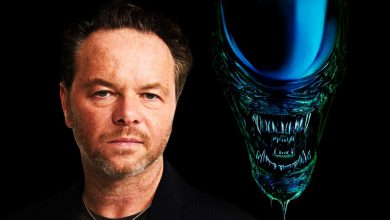Ben Stephenson on Twisting the Mainstream with Poison Pen

In an exclusive interview, Ben Stephenson shares insights into his new indie drama, Poison Pen, and his unique approach to storytelling that aims to reshape mainstream television.
Ben Stephenson Discusses “Twisting the Mainstream” with Indie Drama Poison Pen
EXCLUSIVE: In his first interview since launching the drama indie Poison Pen, Ben Stephenson has outlined plans to “use crime as a fulcrum to tell big characterful stories” and adopt a “different approach” to adapting novels.
Launching Poison Pen
Stephenson, who has held top executive roles on both sides of the Atlantic as BBC drama chief and head of TV for J.J. Abrams’ Bad Robot, launched ITV Studios-backed Poison Pen in 2023, and the move is already yielding results. His second greenlight, an ITV adaptation of GR Halliday’s novel From the Shadows titled The Dark, was announced yesterday, following a series penned by Danny Brocklehurst for the same broadcaster called Adultery.
Twisting the Mainstream
Speaking about his transatlantic indie for the first time, Stephenson stated that Poison Pen is focused on “the mainstream and trying to twist the mainstream.” His initial commissions are both crime shows, and while he emphasized that Poison Pen is “not exclusively crime,” he noted, “We are called Poison Pen, and crime is just such a great fulcrum to tell big characterful stories.”
“It’s not crime for crime’s sake but a way of telling complex, surprising stories that may not resonate without the crime element,” he added. “You can use the genre to introduce unexpected characters and themes.”
The Dark: A Serial Killer Thriller
This is certainly true for The Dark, which aims to bring a serial killer thriller to mainstream ITV. According to Stephenson, the source material reminds him of iconic 1990s hits like The Silence of the Lambs and Basic Instinct.
The show follows Detective Monica Kennedy as she investigates the death of a young man in the picturesque Scottish wilderness, fearing it marks the beginning of a terrifying campaign threatening a rural community. Casting is nearly complete, and Stephenson expressed a desire for the show to be a returning series, noting, “There are three books, and the author is writing more, so we would like that.”
Adultery: Exploring Complex Themes
Revealed by Deadline several months ago, Adultery explores the upheaval in two families’ lives, raising questions about class, grief, and the impact of social media. Both Adultery and The Dark are unapologetically mainstream, aligning with Stephenson’s expertise. At the BBC, his impressive credits included Luther, Line of Duty, Sherlock, and Peaky Blinders. He is currently developing shows with the BBC, ITV, and Netflix, which share a similar focus on the “modern mainstream.”
Fresh Approaches to Storytelling
“My favorite thing is stories that aim to attract a large audience in a fresh and different way,” he said. “I love the idea of people choosing your show to watch over others at the end of a busy day. I saw people watching [Disney+’s] Rivals on the tube and thought, ‘That’s a hit.’”
See More ...
Stephenson believes his team has discovered a gold mine by unlocking Halliday’s novels. One of his first hires was head of IP acquisitions Fern McCauley from Hachette, along with other notable signings like ex-Sky drama exec Preethi Mavahalli and Left Bank’s Luke Woellhaf. He aims for the indie to adopt a “slightly different approach to books.”
“I’m less interested in the big books everyone is chasing,” he added. “Sometimes you can get blindsided by the process and feel a bit of FOMO [fear of missing out], thinking you should just pursue a book because everyone else is. Development and production is a long road, and making a decision about committing to a book in one weekend is not something I believe in.”
Bridging the Atlantic
Stephenson, who worked on Westworld at Bad Robot, is splitting his time between L.A. and London as he strives to establish Poison Pen on both sides of the Atlantic. His transition to Bad Robot was one of the most high-profile UK-to-U.S. moves in years, and he notes that the main differences between the UK and U.S. industries revolve around process.
“None of us enter the business for process, and neither [UK nor U.S.] is better or worse, but in the U.S., you have the studio system, writers’ rooms, and showrunners,” he explained. “Day-to-day experiences are similar to any other job I’ve had, but there are systems that are extremely different that you can only learn by doing. Ultimately, drama is about collaborating with a writer to find an engaging idea that creates a shared language.”
He acknowledged the challenging state of today’s TV drama market, which has been labeled a scripted funding crisis by his former employer, the BBC. However, he remains optimistic, stating, “While there are particular issues around deficits and co-productions, there is still much to be positive about.”
“I guess my advanced age means I have witnessed many different crises, and the reality is producers recognize the problems and seek solutions. There is still much more drama now than there was 15 years ago.”
Stephenson was recently seen as an outside candidate for the top BBC content position, which ultimately went to the corporation’s unscripted chief, Kate Phillips. Notably, he remarked that it is increasingly common for unscripted executives like Phillips and her predecessor, Charlotte Moore (a former documentaries executive), to take these top jobs.
“There’s something in our ‘drama DNA’ that drives us to pursue drama,” he mused. “I remember considering applying for the BBC One Controller job years ago, but I thought, ‘Imagine someone else handling the drama commissioning.’”




